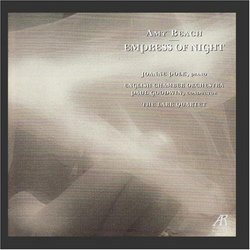Intriguing Romanticism
Evan Wilson | Cambridge, MA | 06/30/2000
(4 out of 5 stars)
"Here is a disc of music that really ought to be better known. Amy Beach was one of the better late romantic composers America produced, but she barely seems to hang around the fringes of the recorded and performed repertoire, which is sad.Of the two pieces, the Piano Concerto is the more immediately appealing. It's a slightly imbalanced piece--the first movement is longer than the following three combined--but it contains appealing and memorable melodies. As the structure indicates, the weight of the musical argument is carried by the first movement which opens with a sombre and memorable theme. The second and fourth movements are of the genial sort, while the brief Largo harkens mournfully back to the beginning.The liner notes suggest that Ms. Beach pitted the piano against the orchestra in a dramatic conflict, but the performance itself undercuts this idea. Joanne Polk is not a barnstormer. Instead, she plays gracefully, with a limpid tone--which frankly to my ears fits the music fine. (I think the writer greatly overstates the element of conflict.) Polk tends to linger and enjoy moments rather than pushing the music to exploit the virtuosic elements. (It would be interesting to hear someone try this approach, however. Maybe, Hyperion will give us another recording under their Romantic Piano Concerto series as the music certainly warrants more than one interpretation.)I'm also confused by the commentator's description of the Piano Quintet as a "concerto without orchestra" since the piano often merely supports the lush and beautiful melodies carried by the strings. Add in Ms. Polk's refined and subdued pianism and this description frankly sounds like nonsense.As a piece, the Quintet sounds very French with lush textures and soaring, long-breathed themes. The tempos are moderate to slow and the general mood ranges from aching sadness to subdued melodrama. There is little of the geniality found in the Concerto, which lends to a certain monotony of feel, but overall it IS a lovely piece.The performances are guided by Ms. Polk's temperment, although the Lark Quartet offers wonderful contributions in the Quintet. I found myself greatly enjoying the music, but I can also see it lending itself to more terse and dramatic an approach. The sound is fine. In any case, don't miss this opportunity to hear two terrific, late romantic pieces that you aren't likely to hear in the concert hall very soon."
OK, but...
Darin Tysdal | Bloomington, MN 55420 | 06/19/2004
(3 out of 5 stars)
"For many years I have lived with Mary-Louise Boehnm's recording of this work on Vox. But the orchestral contribution was just there, and with a concerto like this, it is very important. So many times the orchestra has the most important material while the pianist is accompanying. This recording has much better sound, and the orchestra is more audible, but the conductor needs to move things along a little bit more. It just seems to need a little more movement in order to make this performance effective. It is beautiful, but there is more to this concerto that that. I heartily recommend Alan Feinberg's recording of this on Naxos. That recording is the one we have all been waiting for. Maybe as I get older I will appreciate the Polk performance more, but it is Feinberg's that I will return to most often."


 Track Listings (7) - Disc #1
Track Listings (7) - Disc #1